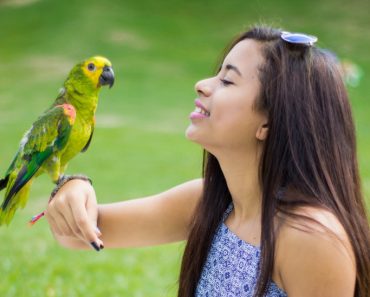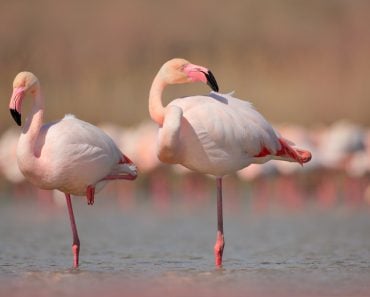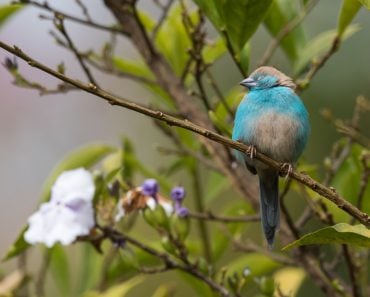Research on why birds sing at dawn indicates that birds may be singing to woo females during mating season, to signal their territory, or it might just be due to hormones!
Ah, the cock-a-doodle-doo of a rooster… humanity’s first alarm clock.
For better or worse, birds of many types are famous for singing in the morning. Scientists call this medley of high and low, long and short, complex and simple tunes the ‘dawn chorus’. Whether you put a pillow over your ears and try your best to ignore it, or if you breathe in the fresh air and music while on an early morning walk, the dawn chorus is an integral part of our understanding of birds.
Birds sing at dawn… but why?
Recommended Video for you:
A Morning Routine
Hormones in most animals, including birds, go through a daily cycle. This helps regulate our functions at various times, encouraging our bodies to undertake necessary processes. Our concentration of melatonin, the sleep hormone, peaks in the late evenings, prompting mammals to feel sleepy. In humans, the stress hormone cortisol peaks in the morning, telling our bodies to get going and burning sugar stores for a burst of morning energy.
One hypothesis is that a sudden dip in melatonin triggers birds to start singing. The problem with this hypothesis is that there is no reason or particular advantage for birds to sing in the morning. It is more a coincidental accident, since the melatonin levels dip in the mornings. Remember, correlation does not equal causation!
Affirmation Time
Another hormonal hypothesis involves the production of androgens. Androgens are a group of sex hormones, and when birds have higher androgen levels, they are typically more successful in social interactions in the context of mating. Some researchers believe that singing induces the production of androgens in male birds, and hearing those songs induces the production of androgens in female birds.
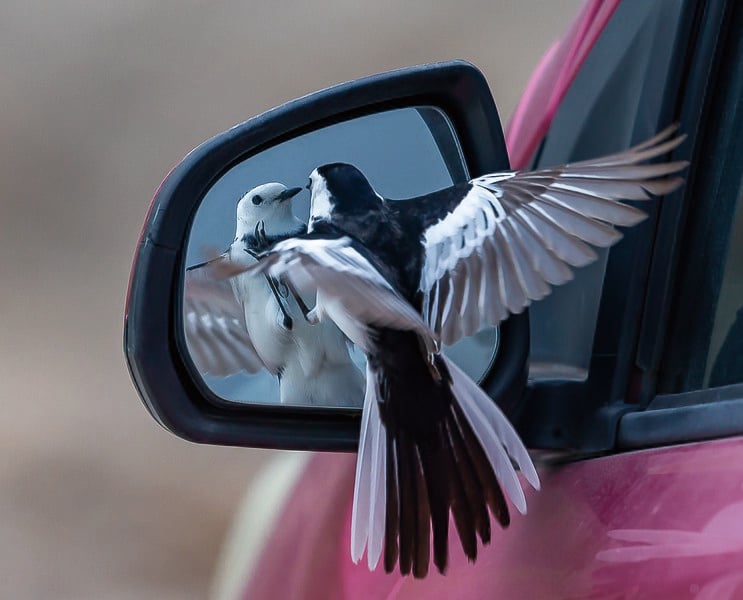
Birds might therefore sing at dawn to increase their levels of androgens, preparing them for a day of socializing. Maybe introverts could use a bit of this before a party!
Feathered Flirts
Each species of bird has their own breeding season. The common mynah breeds once a year—from April to Early June. The house crow breeds throughout most of the year, except during the peak of monsoon season in tropical areas.
Although the dawn chorus might sound the same to us, different birds are actually singing at different times of the year, depending on their breeding season. One hypothesis is that male bird song is a way to manipulate female behavior around the fertile window during the breeding season. Female birds have a fertile window a few days before and a few days after laying their eggs, and eggs are laid at dawn. When studying the great tit (Parus major), they found that male bird song in the dawn chorus peaked right before the females laid their eggs, and tapered off about a week later.
Male birds sing the most when female birds are the most fertile, in order to gain their attention.
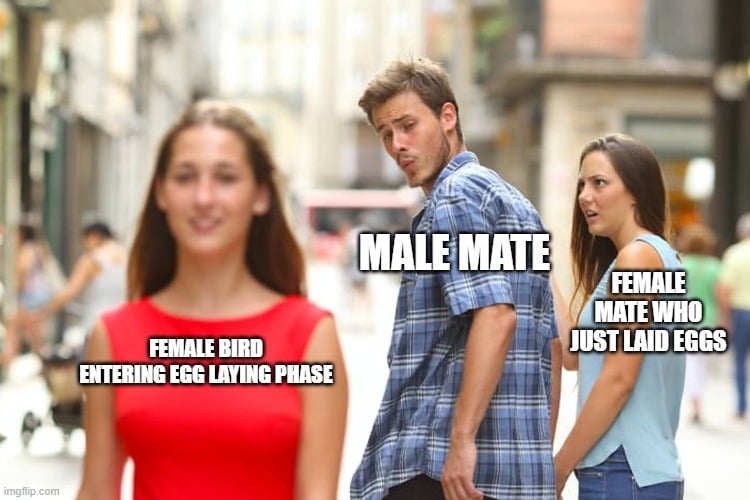
The Borderline
Overnight mortality is a phenomenon where birds die in the night. This can be due to starvation and an inability to forage at night, nocturnal predation, or exposure to the elements and lower temperatures. When birds die overnight, their territories are suddenly up for grabs, leading to territorial instability.
Dawn songs are more complex and louder than songs sung at other times of the day. These songs may be a way for male birds to signal that a territory belongs to them, whether they sing in the middle of their territory or along its borders. Birds without territories may claim newly vacated ones and begin singing there. Birds with existing territories sing the dawn chorus to affirm that their territory is occupied, and to deter any prospective squatters.
Virtue And Honesty
Female birds often choose mates based on their songs, but why is that factor so important? Song can be an indicator of the quality of the male, known as an honest signal. In Zebra finches, those with more developed repertoires of song likely had enough food when they were chicks, leading to better immunity and fitness as an adult. Some researchers believe that the timing of the song at dawn could provide females with clues about the fitness of their male suitors.
In Eastern kingbirds, the earlier singing males are larger, older, and more dominant in the social hierarchy. Interestingly, in the willow tit, earlier singing males were found to be better at avoiding predators. A whole host of studies have found that better fed birds tend to sing earlier. All of this indicates that females who choose the earliest singers will likely have better quality offspring.
Although it isn’t clear why dawn singing is an honest signal of male quality, it has certainly helped females choose mates so far.
The Early Bird Can’t See The Worm
“The early bird gets the worm,” as the adage says, but research indicates that early in the day might be the worst time for birds to look for food. At dawn, light levels and temperatures are low. Very simply, birds can’t see very well at dawn, and therefore cannot effectively look for food. The low temperatures also mean that insects and cold-blooded creatures lay still and don’t skitter about, making them even more difficult to locate.
A lesson in time management: birds choose dawn for purposes like mating and territory, rather than foraging, which is much easier and productive later in the day.

Testing, Testing, Testing 1-2-3
One of the most common hypotheses for why birds sing at dawn is that conditions for sound travel are better at dawn. In other words, sound generally goes further and with less degradation in quality at dawn. Attenuation is a phenomenon wherein sound gets softer at a distance from where the sound is produced. There seems to be less attenuation in the mornings. Low surface temperatures lead to less air turbulence, leading to a smoother medium for sound to travel.
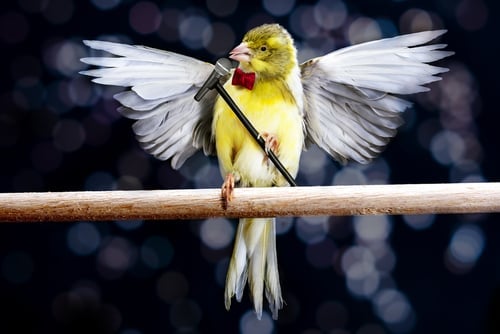
Does The Dawn Chorus Always Start At The Same Time?
New research suggests that birds also change the timing of their singing based on novel phenomena in their surroundings. In tropical forests, where crickets abound, birds change their timing to later in the day to avoid overlapping with the chirping of crickets. Human modification of environments also plays a role in this; city birds near airports pre-pone their songs to avoid overlapping with aircraft noise.
Do We Know Why The Dawn Chorus Exists?
Although we have examined several popular hypotheses that ornithologists use to explain the dawn chorus, we’re still unsure as to why this phenomenon exists. Testing these hypotheses requires a lot of experimental manipulation of birds, and a lot of creativity in coming up with experiments that bring about viable results.
The picture becomes clearer the more research there is, but what is definitely apparent is that there is no one reason why birds sing at dawn – there are many, unique reasons why birds might do so. The more reasons there are to sing at dawn, the more likely the dawn chorus becomes!
References (click to expand)
- Brown, T. J., & Handford, P. (2002, December 17). Why birds sing at dawn: the role of consistent song transmission. Ibis. Wiley.
- Hutchinson, J. M. C. (2002, October). Two explanations of the dawn chorus compared: how monotonically changing light levels favour a short break from singing. Animal Behaviour. Elsevier BV.
- Gil, D., & Llusia, D. (2020). The Bird Dawn Chorus Revisited. Coding Strategies in Vertebrate Acoustic Communication. Springer International Publishing.
- Frankl-Vilches, C., & Gahr, M. (2017, December 6). Androgen and estrogen sensitivity of bird song: a comparative view on gene regulatory levels. Journal of Comparative Physiology A. Springer Science and Business Media LLC.
- &, V. J. Z., & Gaston, A. J. (2008, April 3). Breeding seasons of birds at Calicut, southwest India. Ibis. Wiley.
- Murphy, M. T., Sexton, K., Dolan, A. C., & Redmond, L. J. (2008, March). Dawn song of the eastern kingbird: an honest signal of male quality?. Animal Behaviour. Elsevier BV.
- Barnett, C. A., & Briskie, J. V. (2006, December 5). Energetic state and the performance of dawn chorus in silvereyes (Zosterops lateralis). Behavioral Ecology and Sociobiology. Springer Science and Business Media LLC.
- Stanley, C. Q., Walter, M. H., Venkatraman, M. X., & Wilkinson, G. S. (2016, February). Insect noise avoidance in the dawn chorus of Neotropical birds. Animal Behaviour. Elsevier BV.
- Gil, D., Honarmand, M., Pascual, J., Pérez-Mena, E., & Macías Garcia, C. (2014, November 25). Birds living near airports advance their dawn chorus and reduce overlap with aircraft noise. Behavioral Ecology. Oxford University Press (OUP).
- Bruni, A., Mennill, D. J., & Foote, J. R. (2014, May 5). Dawn chorus start time variation in a temperate bird community: relationships with seasonality, weather, and ambient light. Journal of Ornithology. Springer Science and Business Media LLC.
- Otter, K., Chruszcz, B., & Ratcliffe, L. (1997). Honest advertisement and song output during the dawn chorus of black-capped chickadees. Behavioral Ecology. Oxford University Press (OUP).

